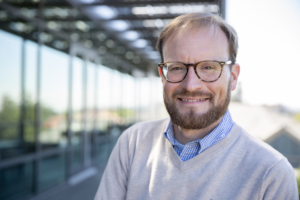
Father John Gribowich, left, works with lead cook Robert Bradshaw as they put away food from the community breakfast served by the Dorothy Day House in Berkeley on July 25, 2018. Photo by Brittany Hosea-Small for Berkeley-Haas
THE EVENTUAL RETURN TO THE PRIESTHOOD … AND THEN BERKELEY
Gribowich returned to New York City, graduated from Pratt, and returned to work at a Catholic school. Around that time, he says, his father became ill; almost immediately after he died, in 2012, Gribowich joined the priesthood. He was ordained in 2015.
Gribowich’s first job was doing parish work at a church in the Jamaica, Queens area of New York. It was typical parish work, he explains — funerals, weddings, Sunday Mass, visiting the sick, prayer groups and Bible studies. “I wasn’t expecting how all-consuming things were. Because you’re just dealing with the heaviness of a lot of people’s sorrows,” he says.
But Gribowich wasn’t a typical priest. He has about five college degrees, has worked for multiple museums in New York City and Philadelphia, and has taught at the college level. In April of this year, that diverse skill set led him to a position at the DeSales Media Group, releasing him from parish work. His role is connecting people to the Church through advanced media technology platforms; eventually, Gribowich says, DeSales’ leaders planned on him running the organization. But there was one problem: Despite his diverse skill set, he didn’t know much about running a media company.
“There’s a lot of money tied up in the whole thing to make it work,” he says. “So an MBA made the most sense for management purposes, leadership purposes, and just a know-how of finance and budgeting.”
Gribowich first looked at full-time MBA programs, but being in his late 30s, he soon realized he didn’t fit most programs’ idea of a typical MBA student. “I didn’t really know what an executive MBA was, to be honest,” he says. But his research led him to the conclusion that “it fit my student profile better,” he acknowledges.

Father John Gribowich stands for a portrait at the Haas School of Business at UC-Berkeley on July 25, 2018. Photo by Brittany Hosea-Small for Berkeley-Haas
AN ‘IMPLODING’ CATHOLIC CHURCH?
As his potential role was in media and technology, Gribowich naturally gravitated in his research to the Haas School at UC-Berkeley. Since the Haas application deadline was earlier than other schools’, Gribowich figured he’d focus hard on it and if he didn’t get in, he’d apply to other programs.
And then he got the good news. He was in at Haas.
To be sure, Gribowich had a plan for his executive MBA experience at Berkeley. He wanted to take advantage of the tech-centric Bay Area to learn as much as possible about advanced media technology platforms. “I think there was this idea coming out here that we were going to build technology products to help parishes better inter-communicate and to share resources as a way to facilitate genuine encounter among people,” he says. But not all plans work out.
APPLYING THE EMBA AND TECH TO THE REINVENTION OF THE CATHOLIC CHURCH
In August, a grand jury in Gribowich’s home state of Pennsylvania dropped a metaphorical bomb on the Catholic Church, finding at least 1,000 cases of sexual abuse conducted by about 300 “predator priests” in six different dioceses within the state over the past 70 years. It was a bombshell like never seen before in the U.S.
“I think we are about to be looking at the structures of the Church very much imploding over the next few years,” Gribowich says. “Just because we won’t be able to sustain from the lack of interest, the lack of numbers, and the lack of credibility now.”
Like any good business student would, Gribowich decided to pivot. Now his mission is to employ technology in the survival and reinvention of the Church.
“I do think that we clearly are at a tipping point as a Church,” Gribowich says. “I think we are going to be in the midst of the greatest crises since the Reformation in the 1500s. And I don’t think that’s being overly dramatic.”
‘WHAT ROLE WILL TECHNOLOGY PLAY IN ALL OF THIS?’
In a way, the situation resembles a business logistic problem. You could make a case study out of it. As Gribowich points out, there will be a lot fewer parishes and a lot fewer priests. “This will require priests to move around — possibly even to people’s homes — to celebrate the sacraments of the Church,” Gribowich says. What’s more, he adds, instead of priests driving the direction of the Church, clergy will need to become more willing to listen to the laity.
And yet, “I do see a more intentional Catholicism,” Gribowich continues. People who do keep showing up are the ones that really want to be there, he explains, and they will be the shapers of the future of the Church. “It’s not going to come from the hands of the bishops and priests,” Gribowich says.
And who knows — Father John Gribowich just might be in the right position to lead that innovation.
“It’s kind of exciting because I think it’s going to be a very different type of non-institutionalized church,” Gribowich beams. “It’s going to be very grassroots. And now it’s like, ‘What role will technology play in all of this?'”
DON’T MISS: THE BIGGEST MYTHS ABOUT EXECUTIVE MBA PROGRAMS or WHAT IT NOW COSTS TO GET AN EXECUTIVE MBA





Questions about this article? Email us or leave a comment below.